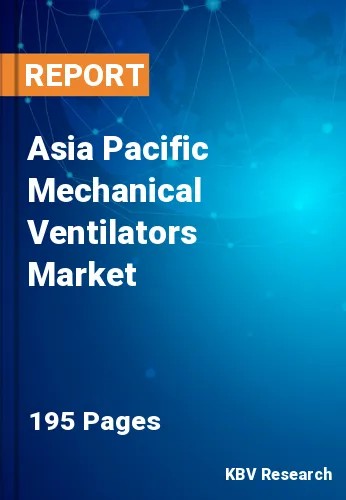The Asia Pacific Mechanical Ventilators Market would witness market growth of 13.4% CAGR during the forecast period (2023-2030). In the year 2021, the Asia Pacific market's volume surged to 259.2 thousand units, showcasing a growth of 28.1% (2019-2022).
Smart ventilators have sensors and artificial intelligence algorithms that continuously monitor patient parameters and adjust ventilation settings in real-time. These devices provide personalized care, reduce complications, and optimize resource allocation. Low-flow ventilation systems, such as Neurally Adjusted Ventilatory Assist (NAVA), synchronize ventilator support with a patient's neural drive to breathe. Modern ventilators have comprehensive monitoring capabilities, allowing healthcare professionals to track patient data, such as lung compliance, oxygen saturation, and ventilation parameters. Integrated monitoring enhances patient safety and facilitates data-driven decision-making.
Ventilators feature advanced alarm systems and notifications to alert healthcare providers to any irregularities or critical changes in a patient's condition. These features help reduce response times and improve patient safety. Dual-limb circuits separate the inspiratory and expiratory limbs, reducing the risk of re-breathing carbon dioxide and improving gas exchange. This design innovation enhances the efficiency of mechanical ventilation. Noise levels in healthcare settings can impact patient comfort and recovery. Low-noise ventilators have been developed to mitigate noise pollution in intensive care units, enhancing patient experience.
As per Invest India, in FY17, the hospital industry in India was worth $ 61.79 billion, projected to reach $ 132 billion by 2023. India has witnessed a substantial increase in hospital infrastructure, establishing new hospitals, medical centers, and specialty clinics. China has a rapidly aging population, and older adults are more susceptible to respiratory conditions and complications. As a result, the demand for these ventilators in acute and long-term care settings has increased in China. According to the National Library of Medicine, asthma is a significant public health issue in China, with a national prevalence of 4.2%, or 45.7 million Chinese adults. All these factors will uplift the regional market’s expansion in coming years.
The China market dominated the Asia Pacific Mechanical Ventilator Market by Country in 2022 and would continue to be a dominant market till 2030; thereby, achieving a market value of $1,328 million by 2030. The Japan market is registering a CAGR of 12.7% during (2023 - 2030). Additionally, The India market would showcase a CAGR of 14.1% during (2023 - 2030).
Based on Mode, the market is segmented into Invasive Ventilation, and Non-invasive Ventilation. Based on Component, the market is segmented into Devices, and Services. Based on Product Type, the market is segmented into Intensive Care Unit/Critical Care, Transport/Portable/Ambulatory, and Neonatal Care. Based on Age Group, the market is segmented into Adult, Geriatric, and Pediatric & Neonatal. Based on End User, the market is segmented into Hospital & Clinic, Ambulatory Surgical Center, Home Care, and Others. Based on countries, the market is segmented into China, Japan, India, South Korea, Singapore, Malaysia, and Rest of Asia Pacific.
Free Valuable Insights: The Global Mechanical Ventilators Market is Predict to reach $16.7 Billion by 2030, at a CAGR of 12.6%
The market research report covers the analysis of key stake holders of the market. Key companies profiled in the report include GE HealthCare Technologies, Inc., Koninklijke Philips N.V., Medtronic PLC, Dragerwerk AG & Co. KGaA, Getinge AB, Asahi Kasei Corporation (Zoll Medical Corporation), Hamilton Medical AG (Hamilton Bonaduz AG), Carl Reiner GmbH, Mindray Medical International Limited and Vyaire Medical, Inc.
By Mode (Volume, Thousand Unit, USD Billion, 2019-30)
By Component (Volume, Thousand Unit, USD Billion, 2019-30)
By Product Type (Volume, Thousand Unit, USD Billion, 2019-30)
By Age Group (Volume, Thousand Unit, USD Billion, 2019-30)
By End User (Volume, Thousand Unit, USD Billion, 2019-30)
By Country (Volume, Thousand Unit, USD Billion, 2019-30)
Our team of dedicated experts can provide you with attractive expansion opportunities for your business.

